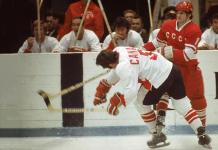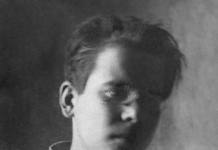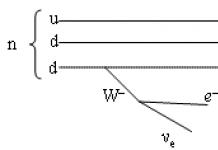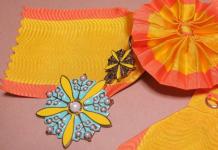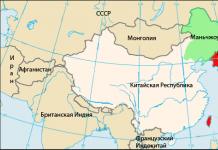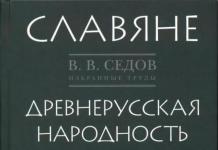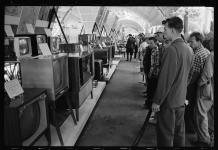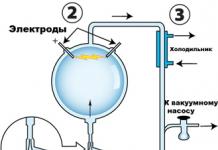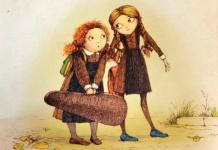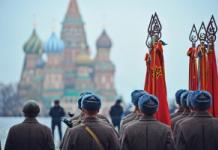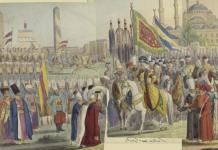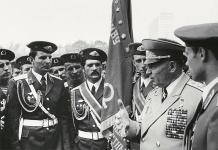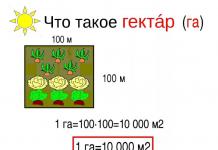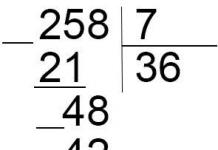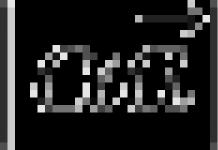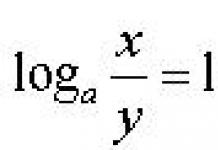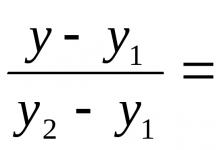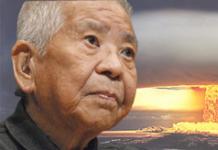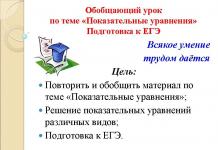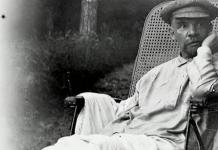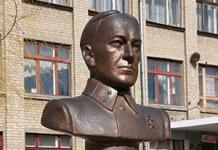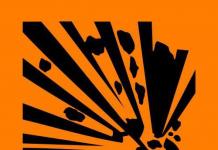On November 14, 1918, a boy was born in the Urals, who was destined to become the first pioneer hero of the USSR, and one of the most controversial figures in Soviet history.
For today's Russian youth, the word "pioneers" sounds about the same as "dinosaurs." Young Russians know only by hearsay about the existence of a mass children's organization in the Soviet Union, in the work of which practically all schoolchildren, starting from the 3rd grade, were involved.
The first hero of the pioneer
At the same time, almost everyone who is over 30 years old managed to personally catch this special layer of Soviet culture associated with the ideological education of young people.
Soviet pioneers, in addition to adults, whose examples were recommended to follow, had their own heroes - teenagers with red ties, who sacrificed their lives for their own ideals, beliefs and in the name of the Motherland.
Pavlik Morozov (in the center, with a book) with a group of fellow practitioners... Photo: Public Domain
The beginning of the gallery of pioneer heroes was, of course, Pavlik Morozov... Unlike many others, Pavel Trofimovich Morozov remained in folklore, although the glory of the "traitor to his father" which was fixed for him in no way reflects the real state of affairs.
According to the canonical Soviet version, Pavlik Morozov was one of the organizers of the first pioneer detachment in the village of Gerasimovka, Tobolsk province. In 1931, in the midst of the struggle against the kulaks, 13-year-old Pavel testified against his father, Trofima Morozova, who, being the chairman of the village council, collaborated with the kulaks, helped them evade taxation, and also hid bread to be delivered to the state. On the basis of these testimonies of the principled pioneer, Trofim Morozov was sentenced to 10 years.
In September 1932, kulaks, among whom were Pavel's own grandfather and the boy's cousin, brutally killed the pioneer and his own younger brother Fyodor in the forest.
In the case of the murder of Pavlik Morozov, four people were convicted - the grandparents of the dead boys, as well as a cousin Danila and godfather Arseny Kulukanov who was his uncle. The direct perpetrator of the crime, Danila Morozov, and one of the "customers" of the murder, Arseny Kulukanov, were shot, and the elderly Kseniya and Sergey Morozov sentenced to imprisonment. Interestingly, one of the accused, Arseny Silin, was fully acquitted.
If in Soviet times Pavlik Morozov was presented as "an unyielding fighter for ideals", then during perestroika, critics characterized him as "an informer who betrayed his own father." The circumstances of the death of the pioneer were also questioned.
What is known today?
Father and son
Pavlik Morozov was indeed one of the first pioneers in the village of Gerasimovka. The village was split - on the one hand, the extreme poverty of some, on the other, the prosperity of the so-called "kulaks", opponents of Soviet power, to whom some of the relatives of Pavel Morozov belonged.
Pavel's father, Trofim Morozov, became the head of the Gerasimov village council, and in this position he left a very bad reputation about himself. He noted what is now called "corruption" - he appropriated the property of the dispossessed, helped wealthy fellow villagers to evade taxes, speculated with certificates issued to special settlers.
A portrait of Pavlik Morozov based on the only known photograph in which he was captured. Photo: Public DomainPavel could not feel warm feelings for his father also because Trofim Morozov left his family, leaving for another woman. Pavel's mother, Tatyana, was left with four children in her arms, virtually without a livelihood. Trofim's parents, Sergei and Ksenia Morozov, hated Tatyana because at one time she refused to live with them in a common house and insisted on partition. They did not harbor warm feelings for Tatiana's children either, calling them, according to the recollections of Pavel's brother, Alexei Morozov, nothing more than "puppies."
And after Pavlik joined the pioneers, in the eyes of his grandfather, he turned into the main object of hatred.
At the same time, Pavel himself was not up to the pioneer fees: after his father left, he became the main man in the family and helped his mother with the housework.
In 1931, the ill fame of Trofim Morozov, who had already left the post of chairman of the village council, reached the ears of the competent authorities. A case of abuse was opened against Morozov. At the trial, Tatyana Morozova gave testimony about the illegal acts of her husband known to her, and Pavel only confirmed the words of the mother, and was stopped by the judge, who did not consider it necessary to demand extensive testimony from the minor. As a result, Trofim Morozov was sentenced to 10 years in prison.
Massacre
There is conflicting information about his future fate. The "whistleblowers" of Pavlik Morozov claim that his father was allegedly shot in the camp in 1938, but there is no evidence of this. According to other sources, Trofim Morozov, after serving his sentence, settled in the Tyumen region, where he lived until the end of his days, trying not to advertise his relationship with Pavlik Morozov.
Considering that Tatyana Morozova gave the main evidence against her ex-husband, Trofim's relatives took revenge not on Pavlik, but on her. On September 2, 1932, Tatyana left on business, and the next day Pavel and his younger brother Fyodor went to the forest for berries. The father's relatives considered it a good opportunity, and, after watching the boys in the forest, dealt with them.
Pavel was stabbed in the stomach and heart, and his brother Fyodor, who was trying to escape, was first hit in the temple with a stick, and then finished off with a knife in the stomach.
The search for the children began on September 5, upon the mother's return. Already on September 6, the bodies were found in the forest. The killers did not particularly try to hide the fact of the massacre. Pavel's mother, Tatyana Morozova, later recalled that when the bodies of the brutally murdered children were brought to the village, Ksenia Morozova, the mother of her ex-husband and the dear grandmother of the victims, told her with a grin: “Tatyana, we made you meat, and now you eat it!”
Investigation into the murder has made it possible to fully prove the guilt of the suspects. Later attempts to see the murder of the Morozov brothers as a "provocation of the OGPU" do not stand up to criticism.
In 1999, representatives of the Memorial movement and relatives of those convicted of the murder of the Morozov brothers tried to get the sentence reviewed. However, the General Prosecutor's Office of Russia, having considered the case, came to the conclusion that the murder of Pavlik Morozov was purely criminal in nature, and the killers had been convicted reasonably and not subject to rehabilitation on political grounds.
Hero and victim
So, pioneer Pavlik Morozov, objectively speaking, was not "an informer and a traitor to his father." Pavel's father, Trofim Morozov, was, in fact, a corrupt person and an extremely dishonest person who abandoned his own children to the mercy of fate.
Reproduction of painting by artist Nikita Chebakov "Pavlik Morozov" (1952). Photo: Public DomainI really don't want to say anything about the relatives of Pavel and Fyodor Morozov, who organized and carried out the brutal murder of minors out of revenge - everything is said about them in the verdict, the validity of which was confirmed by the General Prosecutor's Office of Russia.
The whole trouble of Pavlik Morozov is that in the midst of a sharp confrontation in society in the early 1930s, his tragic death became a banner for the authorities, a symbol of the struggle against those who do not share its ideals and values.
Half a century later, another political force with an anti-Soviet orientation will begin to use Pavlik's tragic fate with no less zeal for its own purposes, throwing mud at the teenager's memory.
From the point of view of his era, Pavlik Morozov was a teenager with strong convictions who opposed the enemies of the existing system and was killed for this. From the point of view of today. Pavlik Morozov is a teenager with a firm outlook on life, who, as a law-abiding citizen, testified in court against an employee of the local administration steeped in corruption, for which he was killed by representatives of criminals.
Pavlik helps
After the death of her two sons, 13-year-old Pavel and 8-year-old Fedor, Tatyana Morozova left Gerasimovka forever. Her other children also suffered a difficult fate - Grisha died in childhood, Roman fought against the Nazis and died of wounds after the war, and Alexei was convicted as an "enemy of the people", spent several years in prison and only later was rehabilitated.
Pavlik Morozov's mother was lucky - she died before perestroika, but Alexei Morozov had to fully feel the streams of dirt and outright lies that fell on his brother during the period of democratic changes.
The paradox is that in the homeland of Pavel in the village of Gerasimovka, where the young pioneer, according to the whistle-blowers, “betrayed and knocked”, his memory is treated extremely carefully. A monument to Pavlik and his museum have been preserved there. Local residents come to the monument, leave notes with their deepest desires. They say Pavlik helps them.
He twice became a victim of political propaganda: in the era of the USSR, he was portrayed as a hero who gave his life in the class struggle, and in perestroika times - as an informer who betrayed his own father. Modern historians have questioned both myths about Pavlik Morozov, who became one of the most controversial figures in Soviet history. 
House where Pavlik Morozov lived, 1950
This story took place in early September 1932 in the village of Gerasimovka, Tobolsk province. The grandmother sent her grandchildren to fetch cranberries, and a few days later the bodies of the brothers with traces of violent death were found in the forest. Fedor was 8 years old, Pavel - 14. According to the canonical version generally accepted in the USSR, Pavlik Morozov was the organizer of the first pioneer detachment in his village, and in the midst of the struggle against the kulaks he denounced his father, who collaborated with the kulaks. As a result, Trofim Morozov was sent into 10-year exile, and according to other sources, he was shot in 1938. 
In fact, Pavlik was not a pioneer - a pioneer organization appeared in their village only a month after his assassination. The tie was later simply added to the portrait for him. He did not write any denunciations against his father. His ex-wife testified against Trofim at the trial. Pavlik only confirmed the testimony of his mother that Trofim Sergeevich Morozov, being the chairman of the village council, sold certificates to the displaced kulaks about the postscript to the village council and that they had no tax arrears to the state. These certificates were in the hands of the Chekists, and Trofim Morozov would have been tried without the testimony of his son. He and several other district leaders were arrested and sent to prison. 
N. Chebakov. Pavlik Morozov, 1952
Relations in the Morozov family were not easy. Pavlik's grandfather was a gendarme, and grandmother was a horse thief. They met in prison, where he was guarding her. Pavlik's father, Trofim Morozov, had a scandalous reputation: he was a reveler, cheated on his wife and, as a result, left her with four children. The chairman of the village council was really dishonest: all the villagers knew that he earned on fictitious certificates and appropriated the property of the dispossessed. There was no political subtext in Pavlik's act - he simply supported his mother, who was unjustly offended by his father. And the grandmother and grandfather for this hated both him and the mother. In addition, when Trofim left his wife, according to his law, the land plot passed to his eldest son Paul, since the family was left without means of subsistence. Having killed the heir, the relatives could count on the return of the land plot. 
Relatives who were accused of the murder of Pavlik Morozov
An investigation began immediately after the murder. Bloody clothes and a knife were found in the grandfather's house, with which the children were stabbed. During interrogations, Pavel's grandfather and cousin confessed to the crime: allegedly, the grandfather held Pavel while Danila stabbed him with a knife. The case had a very big resonance. This murder was presented in the press as an act of kulak terror against a member of the pioneer organization. Pavlik Morozov was immediately proclaimed a pioneer hero. 
Only many years later, many details began to raise questions: why, for example, Pavel's grandfather, a former gendarme, did not get rid of the murder weapon and traces of the crime. Writer, historian and journalist Yuri Druzhnikov (aka Alperovich) put forward a version that Pavlik Morozov denounced his father on behalf of his mother - in order to take revenge on his father, and was killed by an OGPU agent in order to cause massive repression and the expulsion of kulaks - this was the logical end of the story about villainous fists who are ready to kill children for their own benefit. Collectivization took place with great difficulties; the pioneer organization was poorly received in the country. In order to change the attitude of people, new heroes and new legends were needed. Therefore, Pavlik was just a puppet of the Chekists, seeking to arrange a show trial. 
Yuri Druzhnikov and his sensational book about Pavlik Morozov
However, this version drew widespread criticism and was defeated. In 1999, the Morozovs' relatives and representatives of the Memorial movement achieved a review of this case in court, but the Prosecutor General's Office concluded that the murderers had been convicted reasonably and could not be rehabilitated on political grounds. 
Monument to Pavlik Morozov in the Sverdlovsk region, 1968. Pavlik's mother Tatyana Morozova with her grandson Pavel, 1979 
Pioneers visit the place of death of Pavlik Morozov, 1968
The writer Vladimir Bushin is sure that it was a family and everyday drama without any political overtones. In his opinion, the boy was counting only on the fact that his father would be intimidated and returned to the family, and could not foresee the consequences of his actions. He thought only about helping his mother and brothers, since he was the eldest son. 
The school where Pavlik Morozov studied, and now there is a museum named after him 
At the Pavlik Morozov Museum
No matter how the story of Pavlik Morozov is interpreted, this does not make his fate less tragic. For the Soviet government, his death served as a symbol of the struggle against those who do not share its ideals, and in the perestroika era was used to discredit this government. 
Monuments to Pavlik Morozov
Monument to Pavlik Morozov in the city of Ostrov, Pskov region
During the investigation and trial of the father who abandoned their family, Trofim Morozov, chairman of the Gerasimov village council, testified against him in support of his mother's testimony. A few months later, Pavel and his 8-year-old brother Fyodor, who went to the forest for berries, were found dead with stab wounds.
Their own grandfather Sergei (Trofim Morozov's father) and 19-year-old cousin Danila, as well as grandmother Ksenia (as an accomplice) and Pavel's godfather, Arseny Kulukanov, who was his uncle (as a village "fist" - as the initiator and the organizer of the murder). After the trial, Arseny Kulukanov and Danila Morozov were shot, eighty-year-old Sergei and Ksenia Morozov died in prison. Another uncle of Pavlik, Arseny Silin, was also accused of complicity in the murder, but during the trial he was acquitted.
According to the official version, the young pioneer Pavlik Morozov courageously exposed the crimes of the kulaks against the Soviet regime and was killed by them out of revenge.
Biography
Official portrait of Pavlik Morozov. Made on the basis of a photograph with classmates - the only one in his life.
Family
Born into the family of Trofim Morozov, a red partisan, then the chairman of the village council, and Tatyana Semyonovna Morozova, nee Baidakova. The father, like all the villagers, was an ethnic Belarusian (a family of Stolypin settlers, in Gerasimovka). Subsequently, the father abandoned his family (a wife with four sons) and lived in a second family with Antonina Amosova; as a result of his departure, all the worries of the peasant economy fell on the eldest son Pavel. According to the recollections of the teacher Pavel, his father regularly drank and beat his wife and children both before and after leaving the family. Pavlik's grandfather also hated his daughter-in-law because she did not want to live with him on the same household, but insisted on partition. According to Alexei, Pavel's brother, the father “loved only himself and vodka,” he didn’t spare his wife and sons, let alone foreign immigrants, from whom “he tore three skins for letterheads with seals”. Pavel's grandfather and grandmother also treated the family abandoned by his father to the mercy of fate: “Grandfather and grandmother were also strangers to us for a long time. They never treated me to anything, did not greet me. Grandfather did not let his grandson, Danilka, go to school, we only heard: Tatiana's puppies you have laborers "".
According to the memoirs collected and presented in his book by Yuri Druzhnikov, Pavel was a physically weak, sickly, nervous and unbalanced boy. According to Solomein's record, Pavlik "liked to bully, fight, quarrel, sing bad songs, smoke." Druzhnikov, referring to the words of Zoya Kabina, writes that Pavel studied poorly and rarely attended school, liked to play cards for money and sing thieves' songs. He loved to tease, persecute someone: “No matter how much you persuade, he will take revenge, he will do it in his own way. He often fought out of malice, just out of a tendency to quarrel. " In view of the poverty of the family, he wore sandals and his father's tattered coat; was the dirtiest in the class, rarely washed. He was tongue-tied: he spoke with breaks, gekaya, it is not always clear, in a semi-Russian-semi-Belarusian language, like: "It’s balsha ne to go through”. Druzhnikov points out that in 1931 Pavel entered the first grade for the third time and was transferred to the second grade in the middle of the year, since he finally learned to read and write. However, it should be borne in mind that often Paul was not up to study - as the eldest in the family, he had to work hard to feed the large family left by his father and try to escape from poverty.
Pavel's teacher recalled the general appalling poverty in the village of Gerasimovka:
The school she was in charge of worked in two shifts. At that time, we had no idea about radio, electricity, in the evenings we sat by a torch, saving kerosene. Even that there was no ink, they wrote with beet juice. Poverty was generally appalling. When we, teachers, started going home, enrolling children in school, it turned out that many did not have any clothes. The children were sitting on the beds naked, covered with some rags. The kids climbed into the oven and basked there in the ash.
We organized a reading room, but there were almost no books, and local newspapers very rarely came. To some now, Pavlik seems to be a kind of boy stuffed with slogans in a clean pioneer form shape I didn’t see it in my eyes, I didn’t participate in pioneer parades, and I didn’t wear Molotov’s portraits like Amlinsky, and didn’t shout "toast" to the leaders.
Forced in such difficult conditions to provide for his family instead of his father, Paul nevertheless invariably showed a desire to learn. According to his teacher L.P. Isakova:
He was very eager to learn, he took books from me, only he had no time to read, he often missed lessons because of his work in the field and around the house. Then he tried to catch up, did well, and even taught his mother to read and write ...
Doom
Pavel and Fyodor went to the forest, suggesting to spend the night there, on September 2 (in the absence of their mother, who had gone to Tavda to sell the calf). Their bodies were found on September 6. The protocol, drawn up by the district policeman Yakov Titov, informs:
Pavel Morozov lay 10 meters away from the road, with his head to the east. A red bag is put on his head. Paul was dealt a fatal blow in the belly. The second blow was struck in the chest near the heart, under which were scattered cranberries. One basket stood beside Paul, the other was thrown aside. His shirt was torn in two places, and a crimson blood stain on his back. Hair color - light brown, white face, blue eyes, open, mouth closed. At the feet are two birches (...) The corpse of Fyodor Morozov was fifteen meters from Pavel in a swamp and shallow aspen forest. Fedor was hit in the left temple with a stick, his right cheek was stained with blood. The knife inflicted a fatal blow in the belly above the navel, where the intestines came out, and the hand was cut with a knife to the bone.
Trial
The case of the murder of pioneer Pavel Morozov
Show trial of the chairman of the village council s. Gerasimovka, Tavdinsky district, Morozov Trofim gathered hundreds of people.
Read the indictment. The interrogation of witnesses began. Suddenly the thickened silence of the measured course of the trial was permeated by a sonorous child's voice:
- Uncle, let me tell you!
A commotion arose in the hall. The spectators jumped up from their seats, the back rows poured into those sitting, there was a crush at the door. The president of the court with difficulty restored order ...
- It was I who filed a lawsuit against my father. As a pioneer, I give up my father. He was creating a clear counter-revolution. My father is not a defender of October. He helped the kulak Kulukanov Arsentiy in every possible way. It was he who helped the fists to escape. It was he who hid the kulak property so that the collective farmers would not get it ...
“I ask that my father be held accountable so as not to give others the habit of defending their kulaks.
12-year-old pioneer witness Pavel Morozov finished his testimony. No. This was not a testimony. It was a merciless indictment of the young defender of socialism against those who stood on the side of the fierce enemies of the proletarian revolution.
Unmasked by his pioneer son, Trofim Morozov was sentenced to 10 years in prison for communicating with local kulaks, fabricating false documents for them, and hiding kulak property.
Pioneer Pavel Morozov after the trial came to the family of Sergei Morozov's grandfather. The fearless whistleblower was greeted unfriendly in the family. A blank wall of hidden enmity surrounded the boy. The pioneer detachment was native. Pasha ran there as if to his own family, there he shared his joys and sorrows. There they taught him a passionate intolerance for the kulaks and their singers.
And when Pasha's grandfather, Sergei Morozov, hid the kulak property, Pasha ran to the village council and exposed his grandfather.
In the city of winter, Pasha brought Arseny Silin's kulak to fresh water, who had not fulfilled a firm task, and sold a cart of potatoes to his kulaks. In the fall, dispossessed Kulukanov stole 16 poods of rye from a rural Soviet field and again hid them with his father-in-law, Sergei Morozov. Pavel again exposed Kulukanov's grandfather and kulak.
At meetings during sowing, at the time of grain procurement, pioneer activist Pasha Morozov everywhere exposed the intricate machinations of kulaks and podkulachnikov ...
And gradually, thoughtfully, they began preparations for the terrible and bloody massacre of the pioneer activist. First Danila Morozov, Pavel's cousin, and then his grandfather, Sergei, were dragged into the criminal conspiracy. For a fee of 30 rubles, Danila Morozov undertook with the help of his grandfather to finish off his hated relative. Kulak Kulukanov skillfully fueled enmity towards Pavel Danila and his grandfather. Paul was increasingly greeted with brutal beatings and unambiguous threats.
“If you don’t get out of the squadron, then I’ll slaughter you, the damned pioneer,” Danila wheezed, beating Pavel until he lost consciousness ...
On August 26, Pavel filed a threat statement to the district police officer. Whether for political myopia, or for other reasons, the local policeman did not manage to intervene in the case. On September 3, on a clear autumn day, Pavel, together with his 9-year-old brother Fedya, ran into the forest for berries ...
In the evening, calmly in full view of everyone, Danila Morozov and his grandfather Sergei finished the struggle and sat down and headed home.
On the road we turned unnoticed into the forest. We met Fedya and Pasha very close ...
The massacre was short. The knife stopped the rebellious heart of the young pioneer. Then, just as quickly, they did away with an unnecessary witness - nine-year-old Fedya. Danila and his grandfather calmly returned home and sat down to dinner. Grandma Xenia also calmly and busily began to soak the bloody clothes. In a dark corner, a knife was hidden behind the holy images ...
One of these days, the case of the murder of pioneer-activist Pavel Morozov and his nine-year-old brother will be heard on the spot by a show trial.
In the dock are the active inspirers of the murder - the kulaks Kulukanov, Silin, the killers Sergei and Danila Morozov, their accomplice Ksenia Morozova ...
Pavel Morozov is not alone. There are legions like him. They expose the graspers of bread, the plunderers of public property, they, if necessary, bring their podkulach fathers to the dock ...
The role of Morozov in his father's case is not entirely clear. Together with his mother, he testified at the preliminary investigation, saying that his father had beaten his mother and brought things into the house that he received as payment for issuing false documents (in fact, he could not see this, because his father had not lived with his family for a long time). In the murder case, it is noted that "on November 25, 1931, Pavel Morozov filed a statement with the investigating authorities that his father Trofim Sergeevich Morozov, being the chairman of the village council and being associated with local kulaks, was engaged in forging documents and selling them to special settlers kulaks." The denunciation was connected with the investigation into the case of a false certificate issued by the Gerasimov village council to a special settler; he allowed Trofim to be involved in the case. Trofim Morozov was arrested and tried in February of the following year.
Pavel, following his mother, appeared in court, but in the end he was stopped by the judge due to his small age. In the case of the murder of Morozov it is said: "At the trial, son Pavel outlined all the details about his father, his tricks." The speech, allegedly delivered by Pavlik, is known in 12 versions, mostly dating back to the book of the journalist Peter Solomein. In a recording from the archives of Solomein himself, this accusatory speech is conveyed as follows:
| Uncles, my father was doing an obvious counter-revolution, as a pioneer I am obliged to say about this, my father is not a defender of the interests of October, but tries in every possible way to help the kulak escape, stood up for him, and I, not as a son, but as a pioneer, please bring my father to justice , for in the future not to give others the habit of hiding their fist and clearly violating the party line, and I will also add that my father will now appropriate the kulak property, he took the bunk of Arseny Kulukanov's fist (husband of T. Morozov's sister and Pavel's godfather) and wanted to take from him a haystack, but Kulukanov's fist did not give him hay, but said, let him take it better ... |
The background, it is believed, was domestic: Tatyana Morozova wanted to take revenge on her husband who had abandoned her and hoped, by frightening, to return to the family.
The official version of the prosecution
The version of the prosecution and the court was as follows. On September 3, “kulak” Arseny Kulukanov, having learned about the boys leaving for berries, conspired with Danila Morozov, who came to his house, to kill Pavel, giving him 30 rubles and asking him to invite Sergei Morozov, “with whom Kulukanov had an agreement before,” for the murder. Returning from Kulukanov and finishing the harrowing (that is, harrowing, loosening the soil), Danila went home and passed the conversation over to his grandfather Sergei. The latter, seeing that Danila was taking the knife, without a word left the house and went with Danila, saying to him: "Let's go kill, don't be afraid." Finding the children, Danila, without saying a word, took out a knife and hit Pavel; Fedya rushed to run, but was detained by Sergei and also stabbed to death by Danila. " After making sure that Fedya was dead, Danila returned to Pavel and stabbed him several more times.».
The murder of Morozov was presented as a manifestation of kulak terror (against a member of a pioneer organization) and served as a pretext for widespread repression on an all-Union scale; in Gerasimovka itself, it finally made it possible to organize a collective farm (before that all attempts were thwarted by the peasants). In Tavda, in the Stalin club, a show trial of the alleged murderers took place. At the trial, Danila Morozov confirmed all the accusations, Sergei Morozov behaved inconsistently, either confessing or denying his guilt. According to other sources, he did not confess to the murder at all. All other defendants denied their guilt. The main pieces of evidence were a household knife found at Sergei Morozov's, and Danila's bloody clothes, soaked but not washed by Ksenia (before that Danila had killed a calf for Tatyana Morozova). Of the accused, Arseny Silin was acquitted, the rest were sentenced to death; Kulukanov and Danila were shot, eighty-year-old Sergei and Ksenia Morozov died in prison.
Yuri Druzhnikov's version
| There was no investigation. The bodies were ordered to be buried before the arrival of the investigator without examination. Journalists also sat on the stage as prosecutors, talking about the political importance of shooting the kulaks. The lawyer accused the defendants of murder and retired to applause. Different sources report different methods of murder, the prosecutor and the judge were confused about the facts. The murder weapon was called a knife found in the house with traces of blood, but Danila cut the calf that day - no one checked whose blood. The accused grandfather, grandmother, uncle and cousin of Pavlik Danil tried to say that they were beaten and tortured. The shooting of innocent people in November 1932 was the signal for a mass slaughter of peasants throughout the country. |
Decision of the Supreme Court of Russia
Nevertheless, the attempt to present the murderers of the Morozov brothers as victims of political repression and subject to immediate rehabilitation ended in failure. The General Prosecutor's Office of Russia, having carefully considered the case, having studied all the documents, having weighed all the pros and cons, taking into account all the attendant circumstances, came to the following conclusion:
The verdict of the Ural Regional Court of November 28, 1932 and the determination of the judicial-cassation board of the Supreme Court of the RSFSR of February 28, 1933 in relation to Arseny Ignatievich Kulukanov and Ksenia Ilinichna Morozova to change: to re-qualify their actions from Art. 58-8 of the Criminal Code of the RSFSR at Art. Art. 17 and 58-8 of the Criminal Code of the RSFSR, leaving the same punishment. To recognize Morozov Sergei Sergeevich and Morozov Daniil Ivanovich reasonably convicted in the present case for committing a counter-revolutionary crime and not subject to rehabilitation.
This conclusion, together with the materials of an additional examination of case No. 374, was sent to the Supreme Court of Russia, which in 1999 made a final decision and refused rehabilitation to the murderers of Pavlik Morozov and his brother Fyodor.
Reaction to Druzhnikov's book
| What kind of trial was held over my brother? It's offensive and scary. My brother was called an informer in the magazine. Lie it! Paul always fought openly. Why is he being insulted? Little did our family endure grief? Who is being bullied? Two of my brothers were killed. The third, Roman, came from the front as an invalid, died young. During the war I was slandered as an enemy of the people. He served ten years in a camp. And then they rehabilitated. And now the slander against Pavlik. How can you cope with all this? They doomed me to torture worse than in the camps. It's good that my mother did not live up to these days ... I am writing, but tears are choking. So it seems that Pashka again stands defenseless on the road. ... The editor of "Ogonyok" Korotich at radio station "Liberty" said that my brother is a son of a bitch, which means that my mother too ... London, a disgusting book - a clot of such disgusting lies and slander that, after reading it, I got a second heart attack. Z.A.Kabina also fell ill, she wanted to file everything with the international court against the author, but where is she - Alperovich lives in Texas and laughs - try to get him, the teacher's pension will not be enough. Chapters from the book "The Ascension of Pavlik Morozov" by this scribe have been circulated by many newspapers and magazines, no one takes my protests into account, nobody needs the truth about my brother ... Apparently, I have one thing left - to pour gasoline on myself, and that's it! |
Yuri Druzhnikov said that Kelly used his work not only in valid references, but also repeating the composition of the book, selection of details, descriptions. In addition, Dr. Kelly, according to Druzhnikov, came to the opposite conclusion about the role of the OGPU-NKVD in the murder of Pavlik.
According to Dr. Kelly, Mr. Druzhnikov considered Soviet official materials to be unreliable, but used them when it was beneficial to back up his story. According to Katriona Kelly, Druzhnikov published, instead of a scientific exposition of the criticism of her book, a "denunciation" with the assumption of Kelly's connection with the "organs". Dr. Kelly did not find much difference between the conclusions of the books and attributed some of the points of criticism of Mr. Druzhnikov to his lack of knowledge of the English language and English culture.
Disagreements
Veronika Kononenko asserts, referring to Morozov's teacher Zoya Kabin, "that it was she who created the first pioneer detachment in the village, which was headed by Pavel Morozov." According to the testimony of a professor at the University of California, Yuri Druzhnikov, however, Kabina told him: “There was no question of pioneers. I couldn’t tell Solomein anything about admission to the pioneers ”. He also quotes a phrase from Solomein's archive: “And if you adhere to the historical truth, then Pavlik Morozov not only never wore, but never saw a pioneer tie”, which contradicts the recollections of Pavel's first teacher Larisa Isakova: “I did not then I managed to organize it, it was created after me by Zoya Kabina, but I also told the children about how children are fighting for a better life in other cities and villages. Once she brought a red tie from Tavda, tied it to Pavel, and he ran home joyful. At home, his father tore off his tie and beat him terribly. " It is also possible that Paul did not see not a pioneer tie, but a pioneer shape: “To some now Pavlik seems to be a kind of boy stuffed with slogans in a clean pioneer form... And because of our poverty this shape and never saw ... ".
Druzhnikov claims that after the events described, Morozov earned universal hatred in the village; they began to call him "Pashka-Kumanist" (communist). According to the official biographies, Pavel Morozov actively helped to identify the graspers of bread, those who conceal weapons, plotting crimes against the Soviet regime, etc. Druzhnikov considers these descriptions to be too exaggerated in terms of both the number and the duration of Paul's cooperation with the authorities; according to fellow villagers, Pavel was not a serious informer, since “to inform is, you know, a serious job, and he was like that, a nit, a petty dirty trick”. In the murder case, only two such denunciations were documented: “In the winter of 1932, Pavel Morozov informed the village council that Arseny Silin<его дядя>, having failed to fulfill the firm assignment, he sold a cart of potatoes to the special settlers. " Another denunciation was about the peasant Mizyukhin, whom Pavel's grandfather Sergei allegedly hid the "walker" (cart; Mezyukhin's house was searched, but nothing was found).
In fact, the main informant in the village was Pavel's cousin Ivan Potupchik (later an honorary pioneer; convicted of raping a minor).
Similar processes
In the days of the campaign related to the murder of Pavlik, another well-known case was launched about the killing of Kolya Myagotin, a pioneer in the village of Kolesnikovo, Kurgan Region, with his fists on October 25. In this case, 12 people were convicted, 3 of them were shot. In 1996, the convicts were rehabilitated, as it turned out that Kolya, who had never been a pioneer, was shot at night by a soldier-watchman while stealing sunflower seeds. Yuri Druzhnikov counted in 1932 (after the murder of Pavel and Fedya) - 3, in 1933 - 6, in 1934 - 6 and in 1935 - 9 cases of murders of children, qualified by the authorities as murders of pioneers for denunciations; in total, during the Stalinist era, he noted 56 such cases.
Among the "pioneer-heroes" of this kind, there were simply fictitious figures, like Grisha Hakobyan from Ganja, allegedly killed by the "kulak sons" in October 1930 (invented on the instructions of the Central Committee of the Young Communist League of Azerbaijan).
Glorification

Pavlik Morozov denounces his father. Rice. from the newspaper "Pionerskaya Pravda"
The name Morozov was assigned to the Gerasimov and other collective farms, schools, pioneer squads. Monuments were erected to Pavlik Morozov in Moscow (in the children's park named after him on Krasnaya Presnya; demolished in), the village of Gerasimovka () and in Sverdlovsk (). Poems and songs were composed about Pavlik Morozov, an opera of the same name was written. In 1935, film director Sergei Eisenstein began working on the script by Alexander Rzheshevsky "Bezhin Meadow" about Pavlik Morozov. The work could not be completed. Maxim Gorky called Pavlik "one of the little miracles of our era."
Pavlik Morozov in the public mind
Assessments of Pavlik Morozov's personality and especially the propaganda campaign around his name have always been ambiguous. Along with glorification, negative attitudes towards it were widespread, although during Soviet times it could not be expressed publicly.
In an adult environment, the attitude towards Pavlik Morozov was determined by the fact that he turned into a symbol of such a phenomenon that pervaded Soviet society as denunciations. So, Galina Vishnevskaya wrote:
| And a worthy role model appears - the twelve-year-old traitor Pavlik Morozov, “heroically fallen in the class struggle,” awarded for his betrayal of monuments, portraits, glorified in songs and poems, on which future generations will be brought up. Pavlik Morozov, whom even today millions of Soviet children are glorified for what he denounced about his own father and grandfather. Just as in Hitler's Germany, German children were taught to inform on their parents, so here in Russia they began to consciously educate a generation of informers, starting from school. |
With the beginning of perestroika, this attitude found public expression and became dominant. Pavlik Morozov began to act as a symbol of betrayal, along with Judas. In this spirit, for example, Pastor Stanislav Vershinin mentions him in a sermon on the subject of Judas' sin: “Nevertheless, few people want to see Judas Iscariot in themselves - it’s better to admit the presence in your“ I ”of the nature of a murderer, Cain, than such a vile traitor ! Is it so? Have you never betrayed yourself or your neighbor? Is Pavlik Morozov not among us?". In the song of the same name by the rock group "Crematorium" Pavlik Morozov is presented as an ineradicable evil passing from one era to another:
Not everything is for sale here, but everything Buy or rent. On occasion, the janitor can become a prince, And the killer becomes the judge. All the new verses are ripped off the old ones, The new priests are throwing everything on the dead. And all because Pavlik Morozov is alive Pavlik Morozov is alive Pavlik Morozov is alive Pavlik Morozov is more alive than all the living ...Now the prevailing perception is Pavlik Morozov as a victim of the political "games" of adults. It should be emphasized that the overwhelming majority of the polemicizing are extremely politically engaged and biased persons, not interested in establishing an objective picture of what happened.
100 years ago, in November 1918, the most controversial pioneer hero of the Land of the Soviets, Pavlik Morozov, was born. And, according to some sources, he was not a pioneer, and his heroism is highly doubtful. After his tragic death, Soviet propagandists tried to make him a symbol of the struggle of the pioneers with the kulaks.
After perestroika, Pavlik, on the contrary, was blamed for all his sins, declared him a traitor to his father, family and the entire old way of life. But neither one nor the other myths really took root. The story of this boy was too complex and personal.
Village detective
On September 2, 1932, Pavel Morozov's mother went from Gerasimovka to Tavda to sell a calf. On the same day, Pavel took his younger brother Fedya and went with him into the forest to pick berries. The guys were going to spend the night in the forest and return the next day. However, when on the 5th Tatyana Morozova arrived home, they were not yet there. Frightened Tatiana asked her fellow countrymen to look for children in the forest. On the morning of September 6, their bloody corpses were found in an aspen forest near Gerasimovka. The boys were stabbed to death. Beside them were baskets of berries. Pavel Morozov was not even 14 years old at that time, Fedya was only eight. Maddened with grief, Tatyana was met on the street by her mother-in-law and, smiling, said: "Tatyana, we made you meat, and now you eat it!"In hot pursuit, the grandfather, grandmother and paternal cousin of the Morozov boys were arrested. In the house of grandfather and grandmother, they found clothes all stained with blood. The murderers almost didn’t deny it. The show trial over them shocked not only Gerasimovka, but the entire Soviet Union.
House in the village of Gerasimovka, where Pavlik Morozov was born and lived
Background
The brutal murder of two children was the culmination of a difficult family drama and a continuation of the previous high-profile criminal case. A year before that, Pavel's father, Trofim Morozov, was arrested and put on trial. A former red commander, after the Civil War he became the chairman of the village council of Gerasimovka. In his new post, he began to take bribes, to correct certificates and other documents for money. In everyday life, he also "decomposed" - he constantly beat his wife and four children, then left them and went to another woman, drank a lot and made a rowdy.Trofim's relatives stood behind him as a wall and together hated his wife and children. Father Trofim beat his grandchildren and his daughter-in-law in front of the entire village. When Trofim was arrested, his parents and brother decided that Paul was to blame for everything he had slandered his own father.
However, despite all the legends that followed, Paul never wrote any statement about his father. Information about this appeared due to the inaccurate wording of the investigator Elizar Shepelev, who was investigating the murder of Pavel and Fedya Morozov.
In fact, in 1931, the boy simply spoke at the trial of Trofim, confirming that he regularly beat his wife and children, and also took bribes from peasant kulaks. Then the judge did not even let him finish - the boy was considered a minor and could not testify. The documents in the case of his father did not record any testimony of Pavel at all.
The court sentenced Trofim to ten years in prison. When his father was taken to the zone, hell began for Paul. His grandfather, grandmother and godfather called him a "Cumanist" and directly threatened to kill him. Tatyana, who interceded for him, was beaten with mortal combat. In August, just a week before his death, Pavel even filed a complaint with the police about the threats from his grandfather. However, no one protected him. On September 3, his grandfather Sergei and cousin Danila finished the harrowing, took agricultural knives and went to the aspen forest, where Pavel and Fedya were picking berries.

Ideological battle
The Pavlik Morozov case was replicated by Soviet propaganda. Journalists promoted the boy as a true pioneer who fought with fists. We do not know for sure whether Pavlik was a pioneer; only one photograph of him has come down to us. He is wearing it without a pioneer tie. Although poverty in Gerasimovka reigned such that a tie could well have been an unaffordable luxury.The disclosures of the kulaks, allegedly made by Pavel, his denunciations to the OGPU, his search for peasants who hid grain - all this is a later invention of journalists. The only thing we know for sure is that he confirmed at the trial that his father brutally beat his mother and all the children. Yes, the trial of Morozov did not need his testimony: the people to whom Trofim issued fake certificates for bribes were arrested, interrogated, and it was on their testimony that the whole case was based.
It turns out that Pavlik Morozov was neither a hero nor a traitor. He was a victim of domestic violence and hellish morals that reigned in the poor Gerasimovka. Of course, there are questions to the local authorities. It is strange that no one even thought of somehow protecting Morozov's wife and son, who testified against him in an open trial. They could well have been helped with the move, and then the tragedy could have been avoided. For example, after the death of her sons, Tatyana Morozova simply moved to Crimea and lived quietly in Alupka until 1983.
But the true story of the boy from Gerasimovka - a chain of mistakes, crimes and accidents - was of no interest to anyone. They began to make a cult out of Pavlik Morozov.
Monuments were erected to him, schools, streets, parks, houses of pioneers were named after him. The schoolchildren were taught a biography of a "pioneer hero" in which there was almost not a word of truth. Sergei Mikhalkov wrote poems about "Pasha the Communist", they were set to music, and the song was sung by the pioneers of the whole country.
 Pavlik Morozov (in the center, wearing a cap) with classmates, on the left - his cousin Danila Morozov, 1930
Pavlik Morozov (in the center, wearing a cap) with classmates, on the left - his cousin Danila Morozov, 1930The most famous director of the USSR, Sergei Eisenstein, began to shoot the film "Bezhin Meadow" based on the story of Pavlik Morozov. However, there he so vividly depicted the pogrom of the local church, organized by the peasants, that it shocked even Stalin. The unfinished film was ordered to be destroyed, and Eisenstein had to repent for a long time before he was allowed to redeem his guilt by filming Alexander Nevsky.
All this time, parallel to the Soviet cult of Pavlik Morozov, there was an anti-Soviet myth about a boy who betrayed his own father. “Killing children is awful,” argued dissident writer Viktor Nekrasov. “But informing about the father, knowing that this will also lead to death, is it no less awful? .. [Pavlik Morozov]… calls on his peer descendants to follow his example. Watch your fathers, eavesdrop on what they are talking about, spy on what they are doing, and immediately inform your superiors: the father is an enemy, grab him! "
In the era of perestroika, this myth triumphed. The 13-year-old boy was accused of leading his family to a crime by his betrayal. He was accused that after his death Gerasimovka became a collective farm, and the strong peasant kulaks were ruined. Almost all the blunders and crimes of the Soviet regime were hung on him. They tried not to remember about eight-year-old Fedya, who was stabbed to death with Pavel - this death at the hands of "strong peasants" looked too terrible.
Pavlik Morozov again became a victim of ideology - it was just that earlier they made a hero out of him, and now they made him a villain. As in Soviet times, nobody was interested in his real life and terrible death. This is probably the saddest thing in his history.
Most of the people living in the countries of the former USSR will be able to answer the question of what Pavlik Morozov did. Indeed, his story is well known, and the name has long become a household name. True, unlike the communist version, the story has now acquired a rather negative character. What did Pavlik Morozov do? A feat that deserves to be known and remembered for many centuries to come? Or an ordinary denunciation that has nothing to do with heroism? In search of the truth, you will have to hear the supporters of both versions.
Background
Pavlik Morozov was the oldest child in the family of Tatiana and Trofim Morozov. In addition to him, three more boys grew up with his parents. As far as we know from the surviving memories, the family lived on the brink of poverty - the guys didn't even have any clothes. A piece of bread was obtained with difficulty, but, despite this, the boys attended school and diligently learned to read and write.
Their father worked as chairman of the Gerasimov village council and was far from the most popular person. As it later became known, the children were "swollen with hunger" not because of their father's poor earnings. It was just that the money did not reach the house, settling in the pockets of card cheaters and vodka dealers.
And Trofim Morozov turned over a lot of money, and he had a completely thieves' biography. Pavlik Morozov knew what his father was doing: the appropriation of confiscated things, various documentary speculations, as well as covering up those who had not yet been dispossessed. In short, he was extremely active in interfering with the advancement of state policy. One could even say that Pavlik's father himself became a full-fledged fist.
The starving children did not even know about it, because very soon papa finally stopped appearing at home, moving to his mistress. From this point on, the continuation of the story diverges. For some, it takes on a tinge of heroism, while for others it is perceived as an ordinary judicial situation. But what did Pavlik Morozov do?
USSR version
Pioneer Pavlik Morozov was an ardent admirer of the teachings of Marx and Lenin and strove to ensure that his state and people came to a bright communist future. The very thought that his own father was doing everything to break the achievements of the October Revolution was disgusting for him. As a loving son and a man with high moral principles, the hero Pavlik Morozov hoped that his father would come to his senses and become correct. But there is a limit to everything. And at some point, the boy's patience overflowed.

As the only man in the family, after his father left, he had to carry the entire household on himself. He renounced his parent, and when the family ties finally weakened, he acted like a true communist. Pavlik Morozov wrote a denunciation on his father, where he fully described all his crimes and connections with the kulaks, after which he took the paper to the appropriate authorities. Trofim was arrested and sentenced to 10 years.
Rebuild version
Like any Soviet idol, young Pavlik Morozov had to "fall" too. The truth about his life immediately began to be investigated by historians, who turned over dozens of archives to find out what the essence of the pioneer's act was.
Based on these data, they concluded: Pavlik Morozov did not hand over his father into the hands of the Soviet law enforcement system. He just gave testimony, which helped to make sure once again that Trofim is an enemy of the people and a corrupt official who has committed many crimes. In fact, the father of the pioneer was caught, as they say, "hot" - they found fake documents with his signatures. In addition, it should be noted that many members of the village council were arrested and convicted together with him.

Why Pavlik Morozov betrayed his father, if that is how you can call testifying about his relative's crimes, you can understand. Probably, the young pioneer did not think too much about kinship - since childhood, dad was a real "scourge" for the family, who did not give a passage to either his wife or children. For example, he stubbornly did not let the boys go to school, believing that they did not need a letter. This despite the fact that Pavlik had an incredible craving for knowledge.
In addition, Trofim Morozov at that time was no longer even a family man, living with his new passion and drinking endlessly. He didn’t just not care about the children - he didn’t even think about them. Therefore, the son's act is understandable - for him it was already a stranger who managed to bring a lot of evil to the Morozovs' house.
But the story is not over
In fact, there would be no hero if it were not for the events that followed, which led to the fact that Pavlik Morozov became a real great martyr of the Soviet era. A close family friend (Paul's godfather) Arseny Kulukanov decided to take revenge. Since earlier he was actively involved in business with Trofim, and was a "fist", the arrest of a close friend hit hard on the financial situation of the future murderer.

When he found out that Pavel and Fyodor had gone into the forest for berries, he persuaded his middle brother Danila, as well as the Morozovs' grandfather, Sergei, to go after them. What exactly happened then is unknown. We know only one thing - our hero (Pavlik Morozov) and his younger brother were brutally killed, or more precisely, stabbed to death.
Evidence against the "gang" gathered for the murder was the found household knife and Danila's bloody clothes. DNA examinations did not yet exist, so the investigation decided that the blood on the shirt belonged to the brothers of the arrested person. All participants in the crime were found guilty and shot. Danila Morozov immediately recognized all the accusations as true, grandfather Sergei either denied or confirmed his guilt, and only Kulukanov preferred to go into deep defense during the trial.
Propaganda
The Soviet nomenklatura simply could not miss such a case. And the point is not even the fact of testifying against my father - this happened all the time at that time, but in disgusting and low revenge for it. Now Pavlik Morozov is a pioneer hero.
The crime, which received publicity in the press, made a huge resonance. The authorities cited him as proof of the cruelty and greed of the "kulaks": they say, look what they are ready for because of the loss of material gain. Mass repressions began. The dispossession flared up with renewed vigor, and now any wealthy citizen is in danger.

The fact that Pavlik Morozov betrayed his father was lowered - after all, he did it for the sake of a just cause. The boy who laid his life in the foundation of the construction of communism has become a true legend. He was set as an example to follow.
Pavlik Morozov, the feat of a young communist and fighter for the ideas of October, became the theme for a huge number of books, performances, songs and poems. His personality has taken a truly huge place in the culture of the USSR. It is actually very simple to assess the scale of the propaganda - now everyone knows the general plot of what happened to this boy. He had to show the children how important collective values are in comparison with personal and family interests.
Druzhnikov and his theory
In connection with such close attention of the authorities to the incident, the writer Yuri Druzhnikov put forward the idea of falsification of the crime and the deliberate murder of Pavlik by the authorities for his further "canonization". This version formed the basis of the research, which later resulted in the book "Informer 001".
The entire pioneer biography was questioned in it. Pavlik Morozov Druzhnikov was brutally killed by the OGPU. This statement is based on two facts. The first is the protocol of interviewing a witness, allegedly found by the writer in the case of the murder of the Morozov brothers. All would be fine, but the protocol was drawn up two days before the discovery of the corpses and the identification of the criminals.
The second position, which Druzhnikov cites, consists in the absolutely illogical behavior of the killer. According to all the "rules", they should have tried to hide such a cruel crime as best as possible, but the defendants did the opposite. The killers did not bother to bury the corpses or at least somehow hide them, but left them in plain sight right next to the road. The instrument of the crime was carelessly thrown at home, and no one thought to get rid of the bloody clothes. Indeed, there are some contradictions in this, isn't it?
Based on these theses, the writer concludes that this is an unreal story. Pavlik Morozov was killed by order, specifically in order to create a myth. Druzhnikov states that according to the materials of the case, which are in the archives, it is clear how the judge and witnesses get confused and carry incoherent nonsense. In addition, the defendants have repeatedly tried to say that they were tortured.

Soviet propaganda kept silent about the attitude of fellow villagers to the boy's denunciation. The writer claims that "Pashka the Communist" is the least offensive nickname of all that the guy received for his "feat".
Answer to Druzhnikov
Druzhnikov's version deeply offended the only surviving brother, Pavel, who, after the publication of the book in the UK, declared that he could not tolerate such treatment of his relative's memory.
He wrote an open letter to the newspapers, where he condemned the "trial" that was staged to Pavlik. In it, he recalls that in addition to the legend, there is also a real person, a real family, who suffered from these events. He cites as an example the times of Stalin, also full of slander and hatred, and asks: "How many now differ all these" writers "from the liars of that time?"
In addition, it is argued that the arguments found by Druzhnikov do not coincide with the teacher's recollections. For example, she denies that Pavlik was not a pioneer. Indeed, in his book, the writer says that only after the tragic death of the boy was he included in a youth organization in order to create a cult. However, the teacher remembers exactly how the pioneer detachment was created in the village, and the joyful Pavlik received his red tie, which was then removed and trampled by his father. She was even going to sue the international court to defend an already immortalized heroic story called Pavlik Morozov. History did not wait for this moment, as it turned out that in fact, Druzhnikov and his theory were not taken seriously by anyone.
Among British historians, this book literally provoked ridicule and criticism, as the writer contradicted himself. For example, he wrote clearly and clearly that there is no more unreliable source of information than Soviet documents, especially when they relate to the legal system. And the author himself used these recordings to his advantage.
Ultimately, no one argues - the facts of the crime in the USSR were clearly hushed up and hidden. The whole story was presented exclusively in a tone favorable to the leadership. However, there is no evidence that everything that happened was a fiction and a deliberately planned operation. Rather, the case proves how cleverly propaganda can turn out any incident.
Supreme Court
and the related crime were not overlooked during the prosecution's investigation into the rehabilitation of victims of political cases. Attempts were made to find evidence of the ideological background in the murder of the boy. The commission conducted a deep and thorough investigation, after which it declared with responsibility: the murder of Pavel and Fyodor is pure crime. This meant, first of all, the recognition by the new government of a base and vile crime, and on the other hand, it threw Pavlik from the pedestal, declaring him dead not at all in the struggle against the kulaks.
Antihero
Now Pavlik Morozov acts more like an antihero. In the age of capitalism, when everyone should think about himself and his family, and not about the general collective, the people, his "feat" can hardly be called such.
The betrayal of his own father is viewed from a completely different position, as a low and vile act. Now in culture, the boy has become a symbol of an informer who was not worthy of being recorded as a pioneer hero. Pavlik Morozov has become a negative character for many. This is evidenced by the destroyed monuments to the hero.
Many see in his testimony a selfish intent - he sought to avenge his father for his childhood. Tatiana Morozova allegedly did the same, trying to intimidate her husband and force him to return home after the trial. Some writers and culturologists find the very meaning of Pavlik's feat as terrible - an example for children, who teaches them to convey and betray.
Conclusion
Probably, we will never fully find out who Pavlik Morozov really is. Its history is ambiguous and is still full of secrets and understatements. Of course, you can look at it from completely different angles, presenting information as you like.
But, as they say, there was a cult, but there was also a personality. It is worth trying to look at the whole tragedy from another angle, given the difficult time in which Pavlik Morozov and his family lived. It was an era of terrible change, a painful, cruel and destructive period. The USSR lost many intelligent and intelligent people in connection with the purges. People lived in constant fear for their lives and the lives of their loved ones.
In fact, at the center of events lies the simple tragedy of yet another family who lived at the time. Pavlik is neither a hero nor a traitor. He is just a young man who has become a victim of cruelty and revenge. And we can talk about hoax and propaganda as much as we like, but we should never forget about the existence of a real person.
Every totalitarian power has had a similar story. Even Nazi Germany had its own boy-hero, who fell at a young age for the sake of an idea. And this is always the case, for this image is one of the most beneficial for the propaganda machine. Isn't it time to just forget this whole story? Pay tribute to the innocently fallen child and no longer use it as proof of anything, no matter whether it is the greed of the kulaks or the horrors of the USSR.

